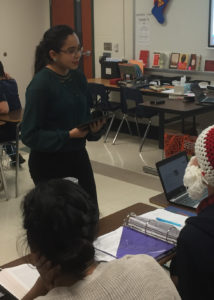• by Daniela Herrejon • IDRA Newsletter • August 2019 •
 I was a great student; however I was not a great learner. I had great teachers. Whether they knew or not that I didn’t give a second thought to their lessons outside of school, I’ll never know. I wanted to start my career and get far away from my neighborhood as soon as possible.
I was a great student; however I was not a great learner. I had great teachers. Whether they knew or not that I didn’t give a second thought to their lessons outside of school, I’ll never know. I wanted to start my career and get far away from my neighborhood as soon as possible.
Born and raised to a working-class family in Westside San Antonio, I had “made it work.” I needed a job as soon as I was 16, but I was also plagued with a love for music and dance. If I wanted to participate in extracurricular activities and work 30 hours, I had to find a way to make the grade without devoting too much time. I embraced student apathy and senioritis until my plan was interrupted.
Of course, it was an English teacher who interrupted my plan – as much as I hate clichés. My teacher, Andres López, would assign readings but also critical thinking and ontological questions. He pushed me past what I thought I was capable of, which is saying something because I was 18 and was more arrogant than Ernesto de la Cruz from the movie, Coco.
But the turning point of my educational career happened when he asked me to lead the class in a lesson. This was a project like no other, and one where I learned as much about the content as I did about myself. Preparing lessons and standing in front of my peers altered completely the dynamic of the class. We were so used to having adults, who in February were already counting down the days to summer, stand with some authoritative PowerPoint and not involve us in the actual action of learning. Suddenly there was a trust in one another to ask questions and talk about concepts we once thought only belonged in higher education.
I could list how many books I read in a six-month period or how my AP scores skyrocketed. But that would not be the true metric of how student-led lessons impacted my class.
I continued to prepare lessons throughout the year and watched my peers do the same. Sitting in a professional learning community (PLC) meeting with other teachers and discussing which lessons and assignments worked and which ones didn’t made us more invested in our education. Having someone ask me how I would like to learn was a first for me and for many other students. Teachers would then adapt their lessons, which solidified our trust in them.
I could list how many books I read in a six-month period or how my AP scores skyrocketed. But that would not be the true metric of how student-led lessons impacted my class. I would much rather tell you how students would gather to discuss literature or ask each other for help with scholarship essays. I would much rather tell you how confident the students walked out of my school in June in comparison to how they came in August. I would rather tell you how I decided to become a teacher myself and am working to reconstruct not only my understanding of school, but my future students’ understanding of the lifelong endeavor of learning.
![]()
Daniela Herrejon is a recent high school graduate from San Antonio.
[©2019, IDRA. This article originally appeared in the August 2019 IDRA Newsletter by the Intercultural Development Research Association. Permission to reproduce this article is granted provided the article is reprinted in its entirety and proper credit is given to IDRA and the author.]



